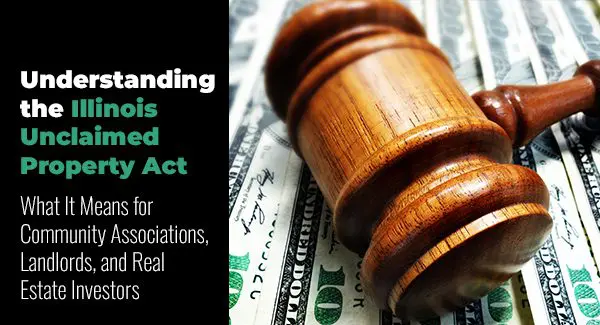- Community Associations, Landlord & Tenant Law, Legal Updates
- Illinois
The Illinois Unclaimed Property Act is a consumer protection law passed in 1961 and significantly amended in 2017 to align with modern standards and best practices. The law governs how Illinois businesses and organizations must handle and report abandoned or unclaimed property. The Illinois Unclaimed Property Act applies to:
- Condominium, homeowner (HOA), and townhome community associations
- Landlords, rental property, and multifamily building owners
- Real estate investors
The unclaimed property can include financial assets such as uncashed refund checks, security deposits, vendor overpayments, and more. If this property remains unclaimed after a specific period, it must be reported and transferred to the Office of the Illinois State Treasurer where it will be held in perpetuity until claimed by the rightful owner or their heirs.
Why It Matters: Community Associations and Other Property Holders Must Comply
Community associations, regardless of incorporation status, are required to report unclaimed funds that are presumed to be abandoned. Under the Illinois Unclaimed Property Act, property is presumed abandoned on the earlier of:
- Three (3) years after the owner first has the right to demand the property, or
- When the obligation to pay or distribute the property arises.
For example, if a unit owner overpays assessments or fails to cash a refund check and no contact is made for three years, the association is required to report and deliver those funds to the State of Illinois.
This issue commonly arises when a community association takes possession of a unit (ex. due to foreclosure, abandonment, extended nonpayment) and collects rent from a tenant to recover delinquent assessments. If the unit owner subsequently disappears or fails to claim the balance, the association may end up with a surplus on the owner’s account which is then considered unclaimed property under the Act.
Key Responsibilities Under the Illinois Unclaimed Property Act
To comply with the Illinois Unclaimed Property Act, community associations, landlords, and other property holders must:
- Identify abandoned property within their records.
- Send written notification (“Due Diligence Letters”) to the last known address of the owner before transferring funds.
- File an Annual Report with the Illinois State Treasurer detailing the unclaimed property.
- Deliver the abandoned property (typically funds) to the State of Illinois.
Noncompliance with the Illinois Unclaimed Property Act can lead to:
- Interest charges on the property amount due.
- Penalties imposed for failure to report or deliver property.
- Increased scrutiny or audits from the State of Illinois Treasurer’s office.
Legal Resource
Whether you’re a community association board member, a landlord, or a real estate investor, it’s critical to understand and comply with the Illinois Unclaimed Property Act.
KSN offers flat-fee legal services to help community associations, landlords, and real estate investors satisfy their obligations under this Illinois law.
Our legal services include:
- Preparing and mailing Due Diligence Letters to owners of the abandoned property.
- Preparing and filing the Annual Report with the Office of the Illinois State Treasurer.
- Coordinating delivery of the funds with the community association board, property manager, landlord, or real estate property owner.
Our law firm can ensure compliance, avoid penalties, and fulfill your fiduciary obligations with confidence.
Questions about the Illinois Unclaimed Property Act, legal requirements, or other legal concerns? Please call 855-537-0500 or visit www.ksnlaw.com.
Since 1983, KSN has been a legal resource for condominium, homeowner, and townhome associations. Additionally, we represent clients in real estate transactions, collections, landlord/tenant issues, and property tax appeals. We represent thousands of clients and community associations throughout the US with offices in several states including Florida, Illinois, Indiana, and Wisconsin.
Please note the material contained in this article is for educational and informational purposes only and does not constitute legal advice. No attorney-client relationship is established by your review or receipt of the information contained in this article. You should not act on the information discussed in this article without first obtaining legal advice from an attorney duly licensed to practice law in your State. While KSN has made every effort to include up-to-date information in this article, the law can change quickly. Accordingly, please understand that information discussed in this article may not yet reflect the most recent legal developments. Material is not guaranteed to be correct, complete, or up to date. KSN reserves the right to revise or update the information and statements of law discussed in the article law at any time, without notice, and disclaims any liability for your use of information or statements of law discussed on the article, or the accessibility of the article generally. This article may be considered advertising in some jurisdictions under applicable law/s and/or ethical rules/regulations. © 2025 Kovitz Shifrin Nesbit, A Professional Corporation.


